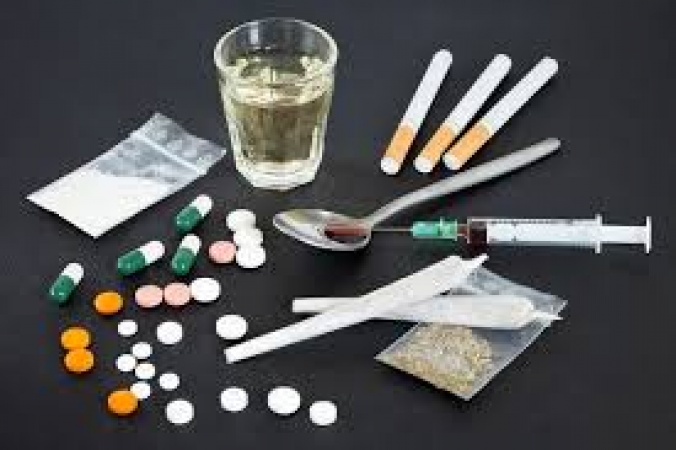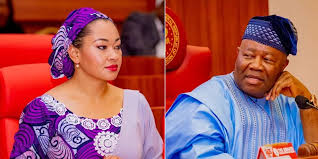
Drug addiction, rehabilitation and enhanced budget
Opinion
By Emmanuel Onwubiko
ANOTHER budgeting circle is here in Nigeria, even as agencies of the federal government are vigorously pursuing and defending robustly their respective proposed budgets in the earliest weeks of January. Some of these agencies are actually finding it very difficult to convince discerning Nigerians about how justified their proposals are when put side by side with the public perception about their performances in the preceding year. However, one agency amongst just a very few stands out as very well qualified for their proposed budget lines, given that in the preceding year, there is an abundance of empirical evidence to show that they achieved many milestones and made the nation and the citizens proud in the eye of the international community. This agency aforementioned that merits the proposed budget or even more is the National Drug Law Enforcement Agency (NDLEA).
The Chairman and Chief Executive Officer of the National Drug Law Enforcement Agency (NDLEA), Brig-Gen Mohamed Marwa (Rtd), had during the budget defense expressed appreciation to the Senate and House Committees on Narcotic Drugs for their commitment to the nation’s fight against substance abuse and illicit drug trafficking while appealing for their continued support to enhance the capacity and capability of the Agency to deliver on its mandate.
The spokesman of the NDLEA, Mr. Femi Babafemi, said in a statement that Marwa made the appeal last Tuesday when he led his management team to defend the 2025 budget proposal of the Agency before the House Committee on Narcotic Drugs and Senate Committee on Drugs and Narcotics, respectively.
He said the Senate and House Committee on Narcotic Drugs had demonstrated remarkable courage and commitment towards the war against drug abuse, especially the effort towards the amendment of the NDLEA Act.
“I respectfully ask your good offices to continue to assist in our area of critical needs during the appropriation process. Our commands across the federation are contending with significant challenges, particularly the lack of accommodation.
“I cannot overstate this matter because it all comes to my desk when you get these reports of attacks on our officers and so on and so forth, killing personnel and their families. We trust that this esteemed committee will do its best. And we know that there are compelling demands from other MDAs, but the barracks project is critical to the operational efficiency and success of NDLEA.
“I must not forget to seize this opportunity to also appreciate President Bola Tinubu for his continuing support and encouragement to the agency. I also wish to reaffirm the agency’s unwavering commitment to working collaboratively with the National Assembly, “in particular this esteemed committee, to advance our shared vision of a drug-free Nigeria.”
A few days after, we also had the rare privilege to get from the horse’s mouth about the phenomenal job that the NDLEA did in the year 2024.
The Chairman/Chief Executive of the National Drug Law Enforcement Agency (NDLEA), Brig Gen Mohamed Buba Marwa (Rtd), said rightly that the steady operational successes which led to 18,500 arrests and the seizure of 2.6 million kilograms of drugs in 2024 justified the global support the Agency is getting.
Director, Media and Advocacy, Femi Babafemi, NDLEA Headquarters Abuja, in a statement last Tuesday, said the feat being recorded by the anti-narcotic body in its drug supply and demand reduction efforts will continue to justify the support it is getting from the United States government, other partners, and stakeholders.
According to the statement, Marwa stated this at the commissioning of the central exhibit office donated by the US government to NDLEA at the Agency’s headquarters annex in Ikoyi Lagos on Tuesday.
The facility was handed over to the NDLEA boss by the US Consulate General, Ms. Jo Ellen Georg, supported by other senior US officials. While commending the United States government as a reliable ally in Nigeria’s renewed efforts to combat drug-related crimes, Marwa said the continued collaboration with the US has been infinite, bolstered, and enhanced NDLEA’s operational capabilities.
According to him, “Today, I am particularly pleased to acknowledge one of such gestures, namely the donation of the office for our central exhibit custodians. This donation acknowledges the critical need for efficient and secure handling of evidence, which is essential for the successful prosecution of drug-related cases.
“This contribution will not only strengthen our operational framework but also set a new standard for accountability and transparency in drug law enforcement. It is an investment in the security and the future of our nations.”
He said despite the Agency’s improved performance, the war against drug trafficking and abuse was far from over.
“As an organization, we are committed to surmounting the challenges.” The NDLEA said the challenges notwithstanding, tremendous successes have been recorded on all fronts against the drug menace.
“So far, the results have been justifying. In 2024, we seized over 2.6 million kilograms of illicit drugs. Across the country, we arrested more than 18,500 drug trafficking offenders. We got over 3,250 convicted, including 10 drug barons, with more than 220 hectares of cannabis farms destroyed.
“In the same breath, we counseled and rehabilitated over 8,200, with more than 3,000 sensitization and advocacy programs organized across the country in schools, markets, motor parks, worship centers, workplaces, and communities, among others, thus creating an equipoise between our drug supply reduction and drug demand reduction efforts,” Marwa said.
While calling for continuous support and more collaboration from the US government and other partners, Marwa said the challenges of illicit drugs are dynamic and multifaceted, and as such require continuous partnership and innovation.
“That is why we are pragmatic in our unending quest for further support from our international partners, key stakeholders, and public-spirited persons. We seek intervention in critical areas such as capacity building and enhanced training for our officers, provision of technology and equipment, especially for advanced surveillance and tracking, intelligence and information sharing, and provision of operational logistics,” he added.
He commended the American people for their support and magnanimity over the years.
“Our shared goal remains the protection of lives and the promotion of a safer, healthier world. As Chairman and CEO of NDLEA, I pledge our commitment to accountability, transparency, and the effective utilization of the resources entrusted to us. I assure you that every donation inspires confidence in the agency and, by extension, inspires resilience, hard work, and dedication among our workforce,” he said.
He specifically thanked the US DEA attaché in Nigeria, Mr. Robert Bascoe, whose untiring efforts and commitment made the donation and several others a reality even as he expressed gratitude to the United States Africa Command and the US Embassy for their invaluable partnership.
In her remarks, the US Acting Consul General, Ms. Jo Ellen Georg said the cornerstone of the relationship between Nigeria and the US is premised on the vibrancy of democracy.
“It’s a principle deeply embraced by both of our nations. And one of our leaders who helped nurture this deep and enduring partnership between our two countries was former President Jimmy Carter, who, as noted, passed away on December 29th at age 100.
“President Carter was an extraordinary leader, and he dedicated his years in and out of office promoting peace, democracy, health, and human rights. And today, as is customary in the United States, his body is being drawn on a horse carriage to the U.S. Capitol to lie in state so that we can all respect the legacy that he has left for us. And President Carter was actually the first U.S. President to make a state visit to Nigeria.”
She highlighted the significance of the support the US government has been providing for the NDLEA while commending Marwa for taking advantage of such partnership to achieve tremendous results for Nigeria in the fight against illicit drugs.
She said: “The efforts to fight drug trafficking in Nigeria and across the West African region have successes because we share the same objective of countering crime, illegal drugs, and instability. Today, as part of our enduring partnership, the U.S. government, through the U.S. Africa Command (AFRICOM), in collaboration with the Drug Enforcement Administration, DEA, is honored to hand over a dedicated office space for the NDLEA.
“This dedicated facility will provide NDLEA officers with a safe and secure office space to conduct investigations, to process arrestees, and to conduct post-arrest interviews.
“Now this donation is the latest example of the robust and productive cooperation between the United States government and the NDLEA. In 2024, the U.S. government invested half a million dollars to modernize and equip the chemical forensic laboratory at the NDLEA zonal office here in Lagos.
“That upgraded laboratory is now equipped with cutting-edge technology, which enhances the NDLEA’s capacity to analyze suspicious substances and to process evidence from crime scenes and suspects.
“Over the years, our joint efforts have helped to build the capacity of the Nigerian authorities to disrupt drug trafficking networks, to dismantle clandestine meth labs, and to conduct advanced forensic analysis of synthetic drugs. We look forward to deepening our collaboration with the Nigerian government and its agencies as we continue to combat narcotics to disrupt the flow of illegal drugs, especially synthetic drugs, and that will better both of our societies.”
Whilst this writer has already endorsed the advocacy for an enhanced budget for the NDLEA, I must state that the counter-narcotics agency is an institution mandated with multiple functions, each requiring full support for its officers to achieve the lofty standards that Nigerians often expect from public officials. One of these functions is the task of rehabilitating addicts and helping them overcome their drug habits.
I tasked Miss Fidel Ujunwa ElilChrist with the responsibility of generating scholarly information to support the NDLEA’s efforts in establishing and running rehabilitation centers for drug addicts across Nigeria, in partnership with the private sector.
Ujunwa Fidel, a graduate of Psychology, clearly stated that drug addiction can develop from the regular use of substances, which can alter brain chemistry and the brain’s reward system. Rehabilitation helps individuals—whether children, adults, or the elderly—become as independent as possible in everyday activities and enables participation in education. It also helps to minimize or slow down the disabling effects of chronic health conditions.
Rehabilitation for drug addiction has several psychological benefits, including:
1. Improved Mental Health
Addiction often exacerbates or masks underlying mental health issues such as depression, anxiety, or trauma. Rehab provides a safe and supportive environment where individuals can work through these issues. It equips addicts with tools to manage their mental health, which can significantly improve their overall well-being.
2. Increased Self-esteem
Rehabilitation can help addicts regain their self-confidence and self-esteem, fostering a more positive outlook on life.
3. Improved Emotional Regulation
Addiction can lead to emotional instability. Rehab teaches individuals how to regulate their emotions in healthy ways and cope with difficult situations without resorting to drugs.
4. Improved Coping Skills
Rehabilitation helps individuals develop healthy coping mechanisms for stress and emotional triggers, reducing the risk of relapse.
5. Improved Impulse Control
Rehabilitation teaches individuals how to resist the impulse to use drugs, enhancing their impulse control in other aspects of life.
6. Greater Emotional Stability
Rehabilitation helps individuals develop a greater sense of stability and calm, leading to improved emotional regulation and better decision-making.
7. Increased Empathy
Rehabilitation often involves group therapy and counseling sessions, which can help individuals develop greater empathy and understanding of others’ struggles.
Many individuals with substance use disorders also experience recurring mental health conditions such as depression, anxiety, or trauma. These dual diagnoses require specialized care to ensure both the addiction and underlying mental health issues are treated effectively. Rehabilitation programs that specialize in dual diagnosis treatment offer integrated approaches to address both conditions simultaneously. By treating both mental health and addiction issues together, individuals gain a deeper understanding of how these issues intersect, resulting in more comprehensive recovery outcomes.
NIGERIAN GOVERNMENT MUST LOOK BACK ON DRUG ADDICTION
The abuse of drugs and other substances, as well as associated crime, has led to a significant rise in the number of youths imprisoned in recent years. A report by the United Nations Office on Drugs and Crime in Nigeria indicates that 14.4% (14.3 million) of people aged between 15 and 64 years abuse drugs.
Since 2004, drug traffickers have increasingly used West African countries, including Nigeria, as transit points for smuggling large quantities of cocaine from South Africa into Europe and North America.
The NDLEA has launched nationwide enforcement activities to seize drugs of abuse and arrest drug users in the community. These activities include sensitization programs, rehabilitation, and border patrol to combat the trafficking of illicit drugs into and out of Nigeria.
There has been a growing prevalence of illicit substance abuse in Nigeria, which is a direct consequence of the increase in the supply of narcotics and psychotropic substances in urban and suburban areas. Drugs such as cocaine, crack, codeine, amphetamines, tramadol, and marijuana are now being abused by teenagers. As a result, our youth are involved in banditry, insurgency, robbery, kidnapping, prostitution, and other criminal activities.
This problem can be mitigated by creating critical awareness through platforms that support drug abuse prevention education among secondary school students via Drug-Free Clubs. Establishing Drug-Free Clubs in secondary schools will create the necessary awareness about the dangers of drug abuse and help curb youth involvement in illicit substances.
The government should help identify, treat, and rehabilitate addicts and prevent drug abuse. Educating the public about the dangers of drug abuse, supplying necessary medications where needed, and ensuring that laws do not discriminate against recovered drug addicts are essential. After resolving an alcohol or drug problem, laws such as preventing people with histories of drug arrests from receiving federal loans for education, and widespread corporate policies forbidding the hiring of people with criminal records, should not be held against those who have recovered from addiction.
ADVANTAGES OF PSYCHOLOGICAL REHABILITATION FOR DRUG ADDICTS
1. Health Recovery
Drug and alcohol rehabilitation centers usually have medical-grade amenities that can help individuals recover and improve both their physical and mental health. Overuse of drugs can significantly impact health, especially as addiction often prevents proper nutrition. With therapies such as massage, along with mental, spiritual, and nutritional treatments, individuals are likely to regain optimal health. Moreover, drug abuse weakens the immune system, making rehabilitation crucial.
2. Restores Sobriety
Learning to stay drug-free independently can be more difficult than anticipated. Drug use alters decision-making, judgment, and learning ability, which can affect daily activities. Even after deciding to quit, there is always the risk of relapse when triggered. Rehabilitation helps addicts regain control of their lives and stay sober.
3. Helps Lead to a Meaningful Life
Addicts often misinterpret drug use as the essence of life. They may miss work and eventually lose their jobs, leading to financial strain and possibly resorting to crime. Attending rehab for drug addiction can help individuals get their lives back on track and find purpose beyond substance abuse.
4. Rebuilds Strained Relationships
Self-isolation is common among addicts. It becomes challenging to relate to friends and family, and they may only connect with fellow drug users. Rehab helps rebuild these relationships and reintroduces healthy social interactions, which are essential for long-term recovery.
5. Increases Positive Social Interactions
Rehabilitation teaches individuals how to rebuild healthy relationships with friends, family, and loved ones, fostering positive interactions and support in maintaining sobriety.
POSSIBILITY THAT A RECOVERED DRUG ADDICT CAN BE BENEFICIAL TO SOCIETY
Recovery is a process through which individuals improve their health, wellness, and live self-directed lives while striving to reach their full potential. Addiction is a treatable disorder, and the majority of people eventually recover, despite numerous legal and social barriers. Most individuals in addiction recovery go on to rejoin society and contribute meaningfully.
Even people with severe and chronic substance use disorders can, with help, overcome their illness and regain social function. When they feel comfortable in their recovery, everything else in their life typically improves—physical and emotional health, family and social relationships, career, financial stability, hygiene, and confidence.
Recovery improves individuals’ well-being, and many people who have overcome alcohol or drug problems accomplish major achievements such as securing a new job, completing a degree, or volunteering. These accomplishments are associated with improvements in quality of life and well-being.
Ujunwa’s submissions justify the earlier endorsement that this writer, along with the entire membership of the HUMAN RIGHTS WRITERS ASSOCIATION OF NIGERIA (HURIWA), has given to the well-intentioned call for a significantly enhanced budget for the NDLEA in the 2025 fiscal year. The National Assembly must approve the necessary logistical and financial support to help the NDLEA play its vital role in making Nigeria a better, more peaceful, and prosperous nation.
18th January, 2025.
C.E.
Tags:Related Posts

Volte-face on 1966 coup; June 12 Annulment: Where do we go from here?
By Obike Ukoh SINCE the `revelation and confession,’ of former Military Head of State, Gen. Ibrahim Babangida in his autobiography,...
Read More
Akpabio/Natasha feud: Refused seat or refused appeal?
By Ike Abonyi “WE have seen the hubris. And now we’re seeing the scandal” – David Gergen The speed of...
Read More
Nigeria’s democracy on trial: Suspension of Senator Akpoti-Uduaghan and systematic erasure of women in politics
By Mabel Adinya Ade THE Nigerian Senate, in a stunning display of patriarchal impunity, has suspended Senator Natasha Akpoti-Uduaghan for...
Read MoreMost Read
Subscribe to Our Newsletter
Keep abreast of news and other developments from our website.


